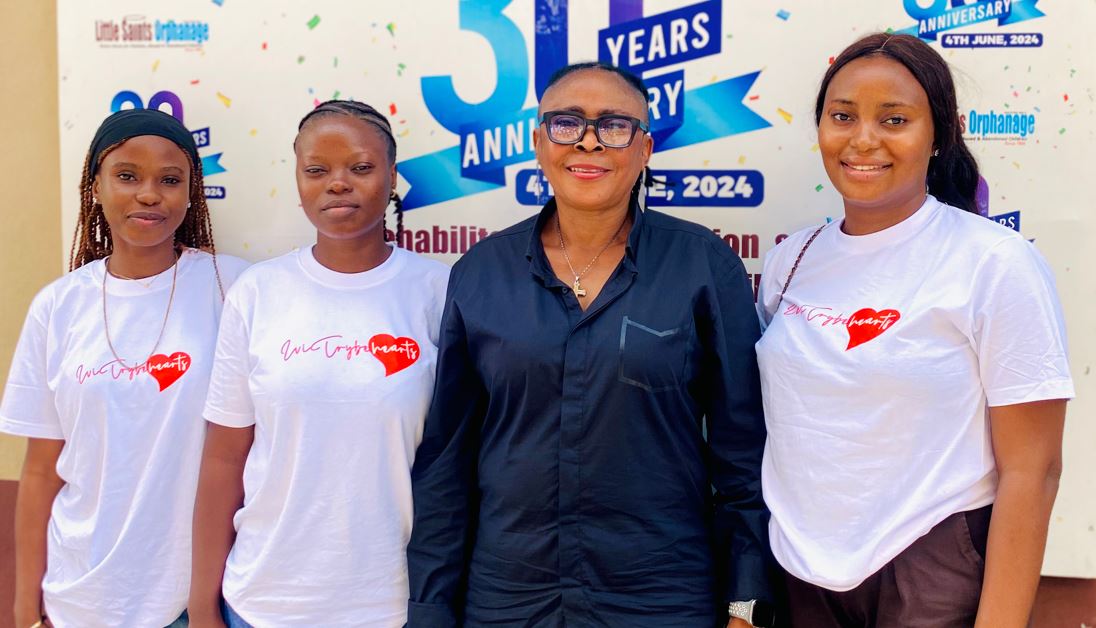News
UK Government Supports 10 Tech Startups with Capacity Building Training, Mentorship

The iNOVO Accelerator Programme launched in January by the UK government through the UK-Nigeria Tech Hub has Created Pipeline of Growth for 10 early stage startups building innovative solutions to tackle the challenges caused by COVID-19 across the Education, Agriculture and Health sector in Nigeria.

The UK-Nigeria Tech Hub reiterated that the programme was designed to empower early-stage Nigerian startups that are solving challenges resulting from the COVID-19 pandemic.
In partnership with StartupBootcamp Afritech and Ventures Platform as implementing partners, this 3-month virtual programme afforded the top 10 selected Startups an opportunity to receive capacity building and learn startup training, mentorship, and support to scale their products and business models rapidly.
The statement also noted the top 10 startups across EdTech, AgriTech and HealthTech received an opportunity to validate their solutions with pilots and proof of concept engagements and use their newfound insights to rapidly pivot and scale.
“All of this was done with the help of dedicated Entrepreneurs, mentors, investors, and industry experts.
“To wrap up the programme, these startups also got the opportunity to pitch in front of an audience comprised of investors, corporate and government partners at the virtual demo day event.
“The second pronged strategy of the programme was to also provide a great learning experience for selected startups that couldn’t make a cut into the programme. Of a total of 750 applications received, the UK-Nigeria Tech Hub also sponsored 100 startups from the pool of applications received to gain life-time access to the Accelerator Squared platform where they are provided with the necessary insights and modules to help them build products and companies to scale impact.
“Founders were very impressed by the Accelerator Squared platform-the interactive playbook that provides startup founders with more than a dozen graduated modules to progress through every stage of the startup journey was a valuable asset that assisted in helping them fine-tune their business models”.
Lamide Johnson, Interim Country Director of the UK-Nigeria Tech Hub, said: ”Seeing the incredible impact this programme has been for the participating startups is a testament to the fact that if we want to give room for innovation to solve some of the arduous problems faced in Nigeria, more interventions such as this are needed to provide the needed information, network and support for early-stage startups building innovative solutions.
“Through this programme, we readily saw the need to support and provide more spring-boards for early-stage startups seeking to scale their impact.”
Speaking on the programme experience, some of the top 10 startups gave remarkable feedback on how the iNOVO Accelerator programme had an impact on their Startups.
The CEO of Schoola Abdul Bature, stated: ‘It has been an incredible 3 months of hardwork. With the help of StartupBootcamp AfriTech and Ventures Platform, our gamified learning solutions for secondary and primary schools has managed to get the attention of corporate parteners and key stakeholders. Which has led to a partnership with the Nigerian Turkish International Colleges and an onboarding of 25 other partners.
Furthering on this: Damilola Olaopa, CEO of Foodbank.ng, a food loan service startup, stated that through the programme, his team has managed to leverage the partnerships made to get the required support.

“The partnerships we have made will help us to scale our operations rapidly. Our partnership with First Bank reduces our exposure to risk as the bank takes on the responsibility of providing the funds, creditworthiness assessment, recollection and reconciliation of loans.
“This will not only help us scale our operations rapidly but will also lead to more revenue for the bank and for us too,” said Dami.
In the course of this programme, cloud-based hospital management startup Medipal secured two major partnerships with notable Insurtech Company, Curacel (Startupbootcamp Afritech alumni) as well as eTranzact- an African finance giant.
Medipal’s client numbers have increased and they have been ranked as Lagos’ number 1 Electronic Medical Record Company by the governing body of hospitals, the Association of General and Private Medical Practitioners of Nigeria.
News
OAU Taps Aderounmu, Tech Advocate as DVC Academics

Obafemi Awolowo University (OAU), Ile-Ife, has appointed Professor Adesola Aderounmu, renowned computer scientist and technology advocate, as its new Deputy Vice-Chancellor (Academics).

Professor Adesola Aderounmu
The decision, made by the university’s Senate, marks a strategic step towards aligning OAU’s academic vision with technological innovation and global best practices.
A distinguished scholar and leader in Computer Science and Engineering, Professor Aderounmu brings decades of experience to this pivotal role.
He has served as the Centre Lead for the African Centre of Excellence in Software Engineering and the Obafemi Awolowo University Knowledge Park (OAK-Park), where he has driven initiatives that advance technological innovation and academic excellence.
His leadership journey includes serving as Dean of the Faculty of Technology and Head of the Department of Computer Science, as well as President of the Nigeria Computer Society from 2015 to 2019. Under his stewardship, the Africa Centre of Excellence in ICT (OAK-Park) was established and has flourished, positioning OAU as a hub for digital transformation in Nigeria and across Africa.
“This is an opportunity to shape the future of education at OAU,” Professor Aderounmu stated. “I am committed to fostering an environment where ideas thrive.”
Professor Aderounmu’s appointment as DVC Academics carries significant implications for the information technology profession and industry in Nigeria and Africa.
His leadership is expected to further bridge the gap between academia and industry, aligning curriculum with emerging technological trends, and fostering research that directly addresses the needs of Nigeria’s evolving digital economy.
His commitment to developing high-level ICT talent will contribute to strengthening the nation’s capacity in critical areas such as artificial intelligence, cybersecurity, software engineering, and digital entrepreneurship.
As Nigeria and Africa continue to embrace digital transformation, this appointment signals a continued push for collaboration between universities and the technology industry, ensuring that graduates are equipped with globally relevant skills while advancing innovative research that supports the tech ecosystem.
This appointment recognises Professor Aderounmu’s unwavering commitment to research, excellence in education, and visionary leadership, and marks a significant milestone in the university’s ongoing mission to deliver impactful education and innovation for national and continental development.
News
IviTrybe Hearts Takes Kindness Drive to Little Saints Home

In a heartwarming demonstration of corporate social responsibility and community impact, IviTrybe Hearts, a key initiative driven by members of IviTrybe – a vibrant group of budding marketing communications specialists – visited the Little Saints Orphanage, Akowonjo branch.

The visit, part of IviTrybe’s ongoing commitment to societal betterment, was significantly supported by Pladis Foods Nigeria, which generously donated gift items and products.
IviTrybe is a social responsibility initiative of IVI PR, a dynamic public relations agency dedicated to not only elevating brands but also fostering positive societal impact. This initiative provides focused practical training covering brand strategy and public relations, directly addressing the critical issue of insufficiently skilled manpower within Nigeria’s Public Relations industry. Through the #IviTrybeHearts program, the group channels its growing expertise into meaningful community engagement.
During the visit, the IviTrybe Hearts team dedicated the day to creating a memorable and impactful experience for the children. Activities included extensive bonding and interaction sessions, where members engaged in games and companionship, fostering an atmosphere of joy and connection. Essential items were donated to support the orphanage’s daily needs, and motivational talks were delivered, inspiring the children with words of encouragement and hope for their futures.
Busari Toheeb Dolapo, IviTrybe Coordinator and spokesperson for the project, underscored the essence of the visit, stating, “For whom much is given, much is expected. We have been empowered through knowledge and mentorship at IVI PR, and it’s only right that we channel that privilege into making a difference. The smiles on the children’s faces today reminded us why giving back is non-negotiable.”
The management of Little Saints Orphanage expressed profound gratitude for the support and the tangible impact of the donations, emphasising how such gestures significantly improve the lives and spirits of the children under their care.
Through impactful initiatives like IviTrybe Hearts, IviTrybe continues to exemplify how youth-led action, empowered by practical training and a strong sense of responsibility, can effectively shape communities and enrich lives for the better.
News
INTERPOL Report Shows Cybercrime is West, East African Most Dominant Security Concern

Cybercrime has emerged as a dominant security concern across Africa, with more than 30 percent of all reported crimes in Western and Eastern regions linked to cyber activity, according to the newly released 2025 Africa Cyberthreat Assessment Report by INTERPOL.

The report, based on data from African member states and private sector partners, reveals that two-thirds of surveyed countries describe cybercrime as constituting a medium to high share of total criminal cases.
This highlights how cyber-enabled criminal activity is evolving rapidly across the continent. The report identified alarming spikes in scam attempts, with some countries witnessing a 3,000 percent increase in suspected scam notifications in the past year.
Neal Jetton, INTERPOL’s Cyber Crime Director, warned that the threat landscape is evolving faster than enforcement responses.
“This fourth edition of the INTERPOL African Cyber Threat Assessment provides a vital snapshot of the current situation, informed by operational intelligence, extensive law enforcement engagement, and strategic private-sector collaboration.
“It paints a clear picture of a threat landscape in flux, with emerging dangers like AI-driven fraud that demand urgent attention. No single agency or country can face these challenges alone,” Jetton stated.
In the past year, suspected scam notifications rose by up to 3,000 per cent in some African countries, according to data from Kaspersky, one of several private sector partners that work with INTERPOL’s cybercrime directorate
Online scams, particularly through phishing, are the most frequently reported cybercrimes across the continent. Ransomware attacks and Business Email Compromise (BEC) incidents are also increasing, particularly in Nigeria, Kenya, South Africa, and Egypt.
“Ransomware detections in Africa also rose in 2024, with South Africa and Egypt suffering the highest number, at 17,849 and 12,281 detections respectively, according to data from Trend Micro, followed by other highly digitised economies such as Nigeria (3,459) and Kenya (3,030),” it stated.
Incidents included attacks on critical infrastructure, such as a breach at Kenya’s Urban Roads Authority (KURA), and on government databases, such as hacks of Nigeria’s National Bureau of Statistics (NBS), the report stated.

 General News2 days ago
General News2 days agoNigeria’s BNPL Market is Projected to Value @ $2.6B by 2030

 Telecom2 days ago
Telecom2 days agoFree WiFi Meets Mega Entertainment at the Grand Opening of Solution Fun City

 E-Financial2 days ago
E-Financial2 days agoNIA Puts Industry Written Premium @ N1.5trn in 2024

 Telecom2 days ago
Telecom2 days agoInstagram Safety Tools Every Parent Should Know About

 Telecom2 days ago
Telecom2 days agoV-Malaysia 2025: QNET Strengthens Global Network with Landmark 5-Day Event

 E-Financial2 days ago
E-Financial2 days agoUN and Sterling One Foundation Lead Coalition Ahead of ASIS 2025

 News2 days ago
News2 days agoINTERPOL Report Shows Cybercrime is West, East African Most Dominant Security Concern

 E-Financial10 hours ago
E-Financial10 hours agoShareholders Oppose Transfer of Unclaimed Dividend to CBN




























